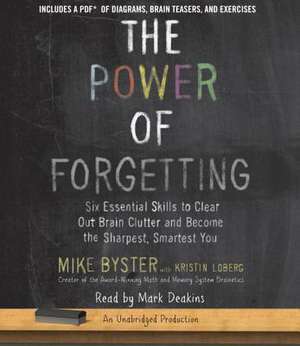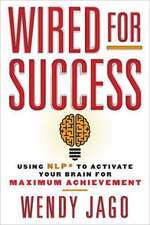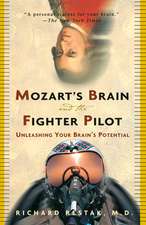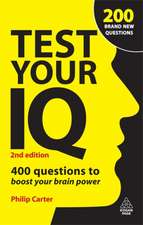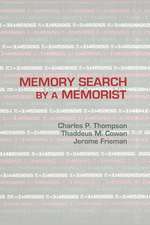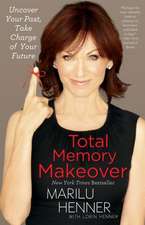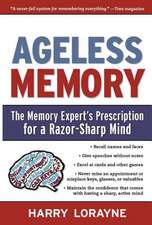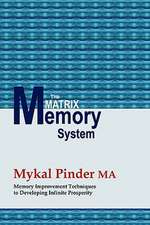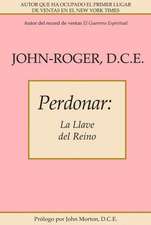The Power of Forgetting: Six Essential Skills to Clear Out Brain Clutter and Become the Sharpest, Smartest You
Autor Mike Byster Mark Deakins Kristin Lobergen Limba Engleză CD-Audio – 17 mar 2014
An uncommon guide for accomplishing more every day by engaging the unique skill of forgetting, from the creator of the award-winning memory training system Brainetics
Is it possible that the answer to becoming a more efficient and effective thinker is learning how to forget? Yes Mike Byster will show you how mastering this extraordinary technique--forgetting unnecessary information, sifting through brain clutter, and focusing on only important nuggets of data--will change the quality of your work and life balance forever.
Using the six tools in "The Power of Forgetting, " you'll learn how to be a more agile thinker and productive individual. You will overcome the staggering volume of daily distractions that lead to to brain fog, an inability to concentrate, lack of creativity, stress, anxiety, nervousness, angst, worry, dread, and even depression. By training your brain with Byster's exclusive quizzes and games, you'll develop the critical skills to become more successful in all that you do, each and every day.
Preț: 203.06 lei
Nou
38.86€ • 40.65$ • 32.28£
Indisponibil temporar
Specificații
ISBN-10: 0804164932
Dimensiuni: 130 x 155 x 30 mm
Greutate: 0.23 kg
Ediția:Completă
Editura: Random House Audio Publishing Group
Recenzii
“Looking to improve your status in life? Want to stand out in a crowd, get ahead of your peers, communicate better, improve your productivity, and gain the confidence to take on any challenge? Then look no further than Mike Byster. He’ll have you living up to your greatest potential in no time.”
—Kathleen Kramer, fund-raising coordinator and former board president of Friends of the Orphans
“Genius is for anyone wanting to maximize the function of this wonderful organ we call the brain. Mental processing is about so much more than how we think. This book is proof that we can train our brains to tap the immeasurable power of thought and accomplish extraordinary things.”
—Eric Kramer, founder of Crestone Capital Advisors
“Mike Byster has done it again. In Genius he not only teaches us impressive and useful mental feats but also reveals the deeper thinking processes and habits that fueled his Brainetics phenomenon. This is a unique and fascinating book.”
—Michael Potts, CEO and president of Rocky Mountain Institute
“I wish I had Mike as a teacher back when I was in school! His indispensible strategies
will have you learning a whole new way to look at the world and take advantage of
opportunities to maximize your brain and get ahead—no matter what your age or IQ.”
—Elaine Appel, cofounder of OxiClean/Orange Glo
“Mike Byster is a genius. He not only has a brain that can think like a genius, but he actually has a practical, doable system for getting anyone to think like one.”
—Brad Ludden, professional kayaker and founder of First Descents, an outdoor adventure program for young adults with cancer
“If you want to think smarter, you need to meet Mike Byster. I can’t think of anyone who won’t find himself or herself—at any age—totally immersed in his down-to-earth wisdom and practical strategies for building and nourishing a better brain. He’s the real deal.”
—Michael Snyder, M.D., surgeon, founder of Fullbar, and author of The Full Diet
“Mike Byster’s simple program is a refreshing departure from other ones that promise to boost your brain power. If you’re tired of feeling left behind at work or in school, Mike will teach you how to run with the geniuses. He’s priceless.”
—Cynthiann King, national director of training at Resource Residential
“If you haven’t met Mike Byster, then you haven’t tapped your true potential. What’s so amazing about his system is that it’s highly applicable and useful toward a broad spectrum of things you want to accomplish—whether you’re a teacher, executive, entrepreneur, business owner, parent, student, or doctor like me.”
—David Charman, M.D., Northwest Medical Group
“Mike Byster has paved the way for me to maximize my success as a leader at work, as well as a parent at home. His approach to optimizing the brain’s capacity is refreshing, practical, and surprisingly innovative. He’s even helped me to transform my relationships with people, solve problems, successfully multitask, and get more done in my day.”
—Valerie Campbell, real estate broker
“Mike Byster is more than genius. The fact that he can actually teach an artist like me how to have a faster, sharper, more mathematical mind puts him in a league of his own.”
—Pamela Vujovich, artist, art studio owner, and instructor at Art in the Square
“Mike came into my engineering firm and taught the guys some of his techniques. It was not only educational, but it was also really fun to watch a smart group of engineers quickly humbled at what Mike could do and then learn how he does it! Engineers aren’t easily impressed, but Mike blew us away.”
—Mark Schwartz, CEO of Product Development Technologies
“Mike Byster’s unique, one-of-a-kind system may be the clearest and best one out there to get you on the path to a better, more agile brain . . . and to a more successful, fulfilling life.”
—Jackie Mortillaro, RN, mother and pediatric nurse
“I can’t get enough of Mike Byster. As an educator, I know that his program is one of the best to optimize brain function I have ever encountered. His incredible teaching skill combined with practical information will change your life.”
—Kristin A. Shelley, M.Ed., licensed parent educator
“Mike Byster is without a doubt one of our nation’s leaders as a top educator who has the gift of making learning fun and exciting. He makes the complexities of igniting full brain potential understandable by everyone.”
—Edna Bazik, Ph.D., associate professor of Mathematics Education and Mathematics Education program coordinator, National Louis University, Chicago
“Mike Byster brings us the manual for developing a quick, smart brain that can rival the greats. Perhaps the best part of his method is the way he delivers his important lessons—in entertaining, fun, and creative ways. He’ll have you learning without really knowing it!”
—Kym Rattunde, licensed auctioneer
“Byster’s math and memory system is manna from heaven . . . engaging and accessible. His ability to break down the secrets to a fast and furious brain into an engrossing and enjoyable program that can be understood by any reader with basic math skills is unique. He will leave you feeling empowered and ready to expand your potential in life.”
—Jill Ryan, real estate broker
Notă biografică
A native of Chicago, Byster still lives in the Chicago area with his wife, Robin, and their teenage son. He is a member of the National Council of Mathematics Teachers and Mensa.
www.MikeByster.com
KRISTIN LOBERG is a professional writer with multiple New York Times and Wall Street Journal bestsellers to her credit, including Phil Town’s Rule #1 and Payback Time, Brenda Watson’s The Fiber35 Diet, and Dr. David B Agus’s The End of Illness. A graduate of Cornell University, she lives in her hometown of Los Angeles.
Extras
You Can Think Like a Genius
How It’s Possible to Develop a Genius Mind Regardless of IQ
We now accept the fact that learning is a lifelong process of keeping abreast of change. And the most pressing task is to teach people how to learn. --PETER DRUCKER
Imagine squaring a three-digit number in your head (for example, 392 times 392) within seconds without a calculator . . . or spelling “whistle-blower” in alphabetical order within ten seconds or less . . . or committing a two-hundred-digit number or twenty-page speech to memory that you can recite on the spot. Can such tasks be learned by anyone? Even you? Absolutely.
A more important question is this: Does being able to perform these mental stunts make you a genius? And if you could already tackle these challenges without first needing a lesson in useful strategies, does that make you a genius? We’re going to find out in this first chapter, which will provide the bedrock for the message of the entire book--that regardless of your innate talents, gifts, natural abilities, and even intelligence quotient (IQ), you can easily develop a set of skills that will make you think like a genius.
The Genie in Genius
If you’re like most people, the term “genius” is foreign to you because it doesn’t describe you. At least that’s what you think. But what if it could? Just what exactly is a genius? And more important, how can an “average” person become one? Is this possible? I’m going to attempt to answer these questions in this first chapter, ultimately proving that, yes, it is indeed possible for you to become a genius.
I think we all can agree that a genius is someone who embodies exceptional intellectual prowess, creativity, originality, or other natural ability to a degree that is typically associated with the achievement of unprecedented insight. Often such visionary outlooks translate into new discoveries that propel society forward and change how all of us live. Without geniuses, our understanding of mathematics, literature, and music would be completely different. Concepts that we now take for granted, like gravity, planetary orbits, and black holes, might still be undiscovered. Innovations that we can’t live without, such as computers, cell phones, and antibiotics and vaccines, could still be centuries away. So there’s no arguing that geniuses are central to advancements in science, technology, and our general understanding of how the world and the human body work. But what if the definition of genius encompassed a much broader array of accomplishments? What if each one of us possesses an inner genius that’s aching to come out and contribute to the world in some way, but just needs a gentle nudge? Interestingly, the word genius, which comes from Latin, literally means “attendant spirit present from birth.” This definition implies that we have an internal spirit who guards and protects us, giving rise to our natural abilities. In fact, from this word we get genie, as in the genie in the bottle of Arabian folklore.
We may never know precisely how one person ends up with the right balance of brainpower, intelligence, and supernatural creativity to become the type of genius who can keep company with Leonardo da Vinci, Thomas Edison, and Marie Curie (the first woman to win the Nobel Prize, for her contribution to physics), but for a moment I want you to believe that there’s a hidden genius, a special genie, within you--no matter how we define a genius. In fact, don’t even bother to define the word genius just yet. We’re going to explore the word and its many meanings in this chapter. For now, begin by simply pondering this question: what could you accomplish if you could think like a genius?
What’s in a Genius?
Although we can get one definition of genius from a dictionary, from a purely scientific standpoint we don’t really know how to define who or what a genius is. That’s right: we really don’t know how to explain genius exactly or what it really means, although sometimes, as Justice Potter Stewart once said of pornography, “we know it when we see it.”
If I were to ask you to name a few famous geniuses, you could probably come up with a handful. You’d think of people like Albert Einstein, who developed the theory of special relativity in 1905 and proved the existence of atoms, which are among the most elementary particles of the universe. He figured out that light behaves as both a particle and a wave, and he also developed his famous equation E = mc², which describes the relationship between matter and energy. Most of Einstein’s brainy work was done when he was in his twenties. Today’s genius physicists are trying to debunk some of Einstein’s grand theories, but I think we can all agree that Einstein will never lose his genius status in the history books. He also seems to be the default image for a modern genius, immortalized in our minds by photos taken of him during his later years--wild hair and all.
Then we have people like Wolfgang Amadeus Mozart, who started composing music when he was five years old. Mozart wrote hundreds of pieces before his death in 1760 at age thirty-five. In more recent times, you might consider the late Steve Jobs a genius, or filmmaker Steven Spielberg, champion chess player Bobby Fischer, theoretical physicist Stephen Hawking, businessman Warren Buffett, South African leader Nelson Mandela, Google founders Larry Page and Sergey Brin, or even Matt Groening, the creator of The Simpsons, to all be geniuses of one kind or another. Anyone you name shares a similar trait: an uncanny ability to do, discover, or create something extraordinary that has an enormous impact on society (with or without the wild hair and quirky personality, and with or without winning a Nobel Prize). And sometimes that “something” is just an idea, perspective, or point of view that shifts how we think and look at the world.
Geniuses might be fairly easy to identify, but defining exactly what makes one person a genius and not another is a little more complicated--borderline impossible. Why? Chiefly because genius is a broad and highly subjective concept that we can’t examine and study like we would a chemical reaction or weather patterns. Some believe that IQ tests are a way to measure and define a genius, but I don’t agree. True, I think we can all see eye to eye on the idea that a genius is a remarkably intelligent person who breaks new ground by using that intelligence in a productive or impressive way, but the real question we should be asking ourselves is this: What makes a person able to do all that? Is it having a more agile brain that has a unique operating system? Is it an instinctive knack for noticing things that other people might consider irrelevant?
For starters, it turns out that, like genius, intelligence can be difficult to quantify too. There is no “chart” that clearly defines different levels of intelligence from “dumb” to “smart.” Psychologists and neuroscientists study intelligence extensively. An entire field of study, known as psychometrics, is devoted to studying and measuring intelligence. But even within that field, experts don’t always agree on exactly what it is or how best to analyze it. And although intelligence is central to genius, not all geniuses score well on intelligence tests or perform well in school.
IQ tests are also standardized so that most people score between 90 and 110. When placed on a graph, the IQ test scores of a large group of people generally resemble a bell curve, with most people scoring in the average range. A common perception is that anyone scoring above a certain number, often 140, is automatically a genius. But in spite of the existence of high-IQ organizations, many scientists caution that there is no such thing as a genius--level IQ.
A COMBINATION OF FACTORS
As much as we can argue that genius entails a combination of factors, we can also see that intelligence encompasses a broad spectrum of possibilities. You don’t have to use your imagination to understand this. Just think of all the “types” of intelligence found in the world among celebrated masters of particular industries or crafts: poets and writers, scientists and mathematicians, composers and musicians, athletes and surgeons, pilots and painters, actors and politicians, philosophers and spiritual leaders, botanists and chefs--and people who have a knack for asking questions about human existence, such as the meaning of life.
All of these different categories of individuals reflect different types of intelligence, according to Howard Gardner, an acclaimed professor at Harvard who has written extensively on the subject. In his latest book, Frames of Mind, he delineates these multiple types of intelligence and explains the various ways in which intelligence is manifested in disparate people. The painter and the pilot, who are said to have spatial intelligence, can think in terms of three-dimensional space better than the novelist, who has linguistic intelligence and mostly thinks in terms of language. Both intelligences are “intelligent” nonetheless. Each has its strengths that allow those who possess it to excel and contribute to the world in their own unique ways.
Not everyone buys into Gardner’s theory. Some people argue that his definitions are so expansive and inclusive that they make intelligence meaningless. What I love about his theory, however, is that it shows how intelligence can be found in a wide variety of hobbies and professions. Just because you’re a carpenter or dancer doesn’t mean you’re not “intelligent.” Far too often we connect intelligence to specific subject areas, like math, science, and philosophy. This kind of insular, shortsighted thinking is what saps people’s self-confidence for no good reason. It also fuels flaws in our education system, which is typically geared toward one or two types of intelligence. Teachers are more likely to teach toward logical mathematics, for example, rather than make up a rap song to help their kids learn.
Regardless of which perspective you subscribe to, all theories on intelligence help us understand that being a genius demands special use of one’s intelligence and one’s brain. More specifically, a genius is someone who employs his or her intelligence to perform two basic but important functions: (1) examining facts and drawing conclusions, and (2) generating new and interesting ideas based on that analysis. In other words, geniuses aren’t just people with a lot of intelligence. Mozart, for example, combined musical genius with an innate understanding of mathematics and patterns. Einstein’s genius spanned the realms of logic, math, and spatial relationships. Steve Jobs’s genius transformed multiple industries by blending his gift for design with his instincts for predicting trends and taking the pulse of consumers’ needs; he created one of the most successful computer and technology companies of our time, yet couldn’t write a single piece of code! All this brings up a good point: a very important aptitude that all geniuses have in common is an abundance of creative braininess.
If creativity is so important to being a genius, the next question we have to ask is How much does it take? Obviously, there’s a big difference between being really smart and creative and being a genius. There’s also a difference between your average starving artist or fledgling entrepreneur and the brilliant ones who define a new genre or establish a new industry--though many do start off starving and fledgling! In addition to harnessing their brain’s creative power to see new things within their field of interest, geniuses have something else in common that probably has everything to do with this difference: they do not accept facts at face value. Even when something seems obvious on the surface, they stop to ask themselves how and why. In other words, they question everything!
Here’s a case in point. In the summer of 2011, an email caught my attention. It was one of those messages that circulate quickly and replicate on sites like Facebook. You might have received a copy too. It went something like this:
This year July has 5 Fridays 5 Saturdays and 5 Sundays. This happens once every 823 years. This is called money bags. So copy this to your status and money will arrive within 4 days. Based on Chinese philosophy of Feng Shui. Those who read and do not copy will be without money. So let’s all try our luck at this and see what happens.
So did I do as the message said to improve my luck? Unfortunately, I didn’t get past the second sentence: “This happens once every 823 years.” Did you get any further? Think about it: in order for a single month to have five Fridays, Saturdays, and Sundays, the first of the month must be a Friday, and the month must have thirty-one days in it. This can’t possibly happen only once every 823 years, even when you factor in leap years. In fact, it occurs much more frequently than we think: it will happen again in March 2013, and then again in August 2014. If you thought the statement referred only to the month of July, then you’ll have to wait until 2016 for July to contain five Fridays, Saturdays, and Sundays again. But other months will have this pattern much sooner.
How many people have fallen for this, probably to this day? Millions. And millions who are a lot smarter than the person who invented this lie to dupe all of us! But when you think like a genius, you take more time to figure things out and question whatever you’re faced with. You listen to your gut instincts and employ logic and common sense more frequently. Geniuses try to disprove, debunk, invalidate, and refute the norm. Geniuses don’t conform, and neither should you.
We may never know precisely what defines a genius, where extraordinary creativity and inventiveness come from, why some people use their creativity more than others, or why some people are most creative during specific times in their lives. Mozart did his best work when he was young, whereas Ludwig van Beethoven, another musical genius, created his masterpieces late in life. And then there are the geniuses who produce exceptional work throughout their lives, like the Steve Jobses and Steven Spielbergs of the world, so there’s really no rhyme or reason to it. Even if the answers to those questions remain a mystery, the important point is this: geniuses are not the product of an exacting list of ingredients. Genius is a mixed bag, although we should certainly pay attention to some trends. Just as spaghetti can be made in an infinite number of ways of combining commonly shared ingredients, spaghetti is still spaghetti. (Though not all spaghetti tastes the same, just as Mozart’s contributions to society--what was coming out of his “kitchen”--were totally different from Einstein’s.) So, while the recipe for a genius may be inexact, that’s a good thing: the door remains open for all sorts of people to work on the common characteristics (common ingredients) of genius: sorting and analyzing data, being willing to experiment outside the box and look at things differently, tapping imagination and creativity, retaining lots of information in a well-organized manner, and having the guts to make new and bold statements or conclusions that defy conventional wisdom, break established rules, and push the envelope. These very attributes are the six skills that you’re about to acquire in this book. So, can you train your brain to operate like a genius? Yes.
